
Peacekeeping comprises activities, especially military ones, intended to create conditions that favor lasting peace. Research generally finds that peacekeeping reduces civilian and battlefield deaths, as well as reduces the risk of renewed warfare.

The United Nations Organization Stabilization Mission in the Democratic Republic of the Congo or MONUSCO, an acronym based on its French name Mission de l'Organisation des Nations Unies pour la stabilisation en République démocratique du Congo, is a United Nations peacekeeping force in the Democratic Republic of the Congo (DRC) which was established by the United Nations Security Council in resolutions 1279 (1999) and 1291 (2000) to monitor the peace process of the Second Congo War, though much of its focus subsequently turned to the Ituri conflict, the Kivu conflict and the Dongo conflict. The mission was known as the United Nations Mission in the Democratic Republic of Congo or MONUC, an acronym of its French name Mission de l'Organisation des Nations Unies en République démocratique du Congo, until 2010.
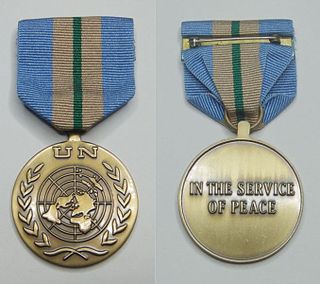
A United Nations Medal is an international decoration awarded by the United Nations (UN) to the various world countries members for participation in joint international military and police operations such as peacekeeping, humanitarian efforts, and disaster relief. The medal is ranked in militaries and police forces as a service medal. The United Nations awarded its first medal during the Korean War (1950–1953). Since 1955, many additional United Nations medals have been created and awarded for participation in various United Nations missions and actions around the world.

Märta Elisabeth Rehn is a Finnish former politician and diplomat. She served as the Minister of Defence of Finland during 1990 to 1995 and as an Under-Secretary-General of the United Nations during 1998 to 1999. She was also a member of the Finnish Parliament and parliamentary leader of the Swedish People's Party of Finland, and a member of the European Parliament.
United Nations Security Council Resolution 1325 (S/RES/1325), on women, peace, and security, was adopted unanimously by the UN Security Council on 31 October 2000, after recalling resolutions 1261 (1999), 1265 (1999), 1296 (2000), and 1314 (2000). The resolution acknowledged the disproportionate and unique impact of armed conflict on women and girls. It calls for the adoption of a gender perspective to consider the special needs of women and girls during conflict, repatriation and resettlement, rehabilitation, reintegration, and post-conflict reconstruction.
Panzi Hospital in Bukavu, the capital of the Sud-Kivu province in the Democratic Republic of the Congo. It specializes in treating survivors of violence, the large majority of whom have been sexually abused. After years of military rape in South Kivu, there is increased civilian adoption of sexual violence.
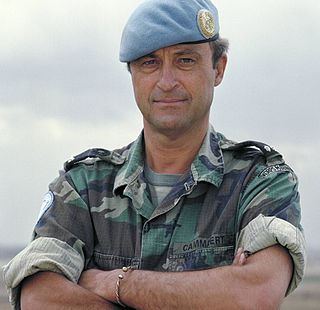
Major General Patrick Cammaert is a retired Dutch general who served as the United Nations Force Commander for the Eastern Democratic Republic of the Congo. He served since 1968 and graduated in parachuter and commando courses. He was previously the Military Advisor to the Secretary-General of the United Nations. Prior to that position, he was the Force Commander of the United Nations Mission in Ethiopia and Eritrea (UNMEE), as the Military Adviser in the Department of Peacekeeping Operations, and has spent a career in the Royal Netherlands Marines specializing in peacekeeping operations.
A special representative of the Secretary-General is a highly respected expert who has been appointed by the Secretary-General of the United Nations to represent them in meetings with heads of state on critical human rights issues. The representatives can carry out country visits to investigate alleged violations of human rights and act as negotiators on behalf of the United Nations.

The Bangladesh Armed Forces and the Bangladesh Police have been actively involved in a number of United Nations Peace Support Operations (UNPSO) since 1988. Currently Bangladesh is the largest contributor in the UN peacekeeping missions.

The Kivu conflict is an umbrella term for a series of protracted armed conflicts in the North Kivu and South Kivu provinces in the eastern Democratic Republic of the Congo which have occurred since the end of the Second Congo War. Including neighboring Ituri province, there are more than 120 different armed groups active in the eastern Democratic Republic of Congo. Currently, some of the most active rebel groups include the Allied Democratic Forces, the Cooperative for the Development of the Congo, the March 23 Movement, and many local Mai Mai militias. In addition to rebel groups and the governmental FARDC troops, a number of national and international organizations have intervened militarily in the conflict, including the United Nations force known as MONUSCO, and an East African Community regional force.

The Democratic Republic of the Congo, and the east of the country in particular, has been described as the "Rape Capital of the World", and the prevalence and intensity of all forms of sexual violence has been described as the worst in the world. Human Rights Watch defines sexual violence as "an act of a sexual nature by force, or by threat of force or coercion", and rape as "a form of sexual violence during which the body of a person is invaded, resulting in penetration, however slight, of any part of the body of the victim, with a sexual organ, or of the anal or genital opening of the victim with any object or other part of the body."
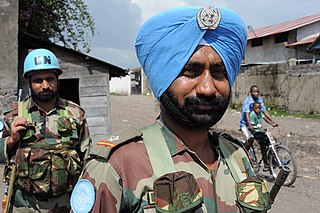
United Nations Security Council Resolution 1925, adopted unanimously on May 28, 2010, after reaffirming previous resolutions on the situation in the Democratic Republic of the Congo, the Council extended the mandate of the United Nations Mission in the Democratic Republic of Congo (MONUC) until June 30, 2010, authorised a withdrawal of 2,000 troops and decided that from July 1, 2010, MONUC would be known as the United Nations Organization Stabilization Mission in the Democratic Republic of the Congo (MONUSCO) with a mandate until June 30, 2011.

United Nations Security Council resolution 1493, adopted unanimously on 28 July 2003, after recalling all resolutions on the situation in the Democratic Republic of the Congo, the council extended the mandate of the United Nations Mission in the Democratic Republic of Congo (MONUC) until 30 July 2004 and raised its troop level from 8,700 to 10,800.

The United Nations Police (UNPOL) is an integral part of the United Nations peace operations. Currently, about 11530 UN Police officers from over 90 countries are deployed in 11 UN peacekeeping operations and 6 Special Political Missions. The "mission of the UN Police is to enhance international peace and security by supporting Member States in conflict, post-conflict and other crisis situations to realise effective, efficient, representative, responsive and accountable police services that serve and protect the population".

United Nations Security Council Resolution 1991, adopted unanimously on June 28, 2011, after reaffirming previous resolutions on the situation in the Democratic Republic of the Congo, the Council extended the mandate of the United Nations Organization Stabilization Mission in the Democratic Republic of the Congo (MONUSCO) until June 30, 2012.
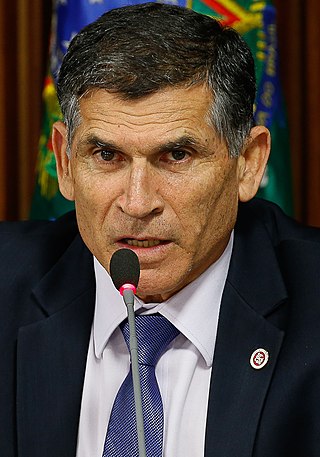
Divisional general Carlos Alberto dos Santos Cruz is a Brazilian military officer who previously held the post of Force Commander of the United Nations' peacekeeping force in the Democratic Republic of the Congo. He was appointed to this position by United Nations Secretary-General Ban Ki-moon on 17 May 2013 and replaced by Derrick Mbuyiselo Mgwebi on 29 December 2015. He was Minister-Secretary of Government of Brazil, nominated by President Jair Bolsonaro, from 1 January 2019 to 13 June 2019.

The United Nations Force Intervention Brigade (FIB) is a military formation which constitutes part of the United Nations Organization Stabilization Mission in the Democratic Republic of the Congo (MONUSCO). It was authorized by the United Nations Security Council on 28 March 2013 through Resolution 2098. Although it is not the first instance in which the use of force was authorized by the UN, the Force Intervention Brigade is the first UN peacekeeping operation specifically tasked to carry out targeted offensive operations to "neutralize and disarm" groups considered a threat to state authority and civilian security. In this case, the main target was the M23 militia group, as well as other Congolese and foreign rebel groups. While such operations do not require the support of the Armed Forces of the Democratic Republic of the Congo (FARDC), the Force Intervention Brigade often acts in unison with the FARDC to disarm rebel groups.
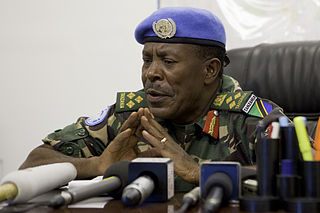
Lieutenant General James Aloizi Mwakibolwa is a Tanzanian military officer. He served as chief of staff of the Tanzania People's Defence Force (TPDF) between 2017 and 2018 and previously commanded the Force Intervention Brigade (FIB) of the United Nations' MONUSCO peacekeeping mission in the Democratic Republic of the Congo between 2013 and 2014. His command encompassed the M23 rebellion and Mwakibolwa was personally credited with making an important contribution to the defeat of the M23 rebels in Kivu Province.

The Office of the Special Representative of the Secretary-General on Sexual Violence in Conflict (OSRSG-SVC) is an office of the United Nations Secretariat tasked with serving the United Nations' spokesperson and political advocate on conflict-related sexual violence, the Special Representative of the Secretary-General on Sexual Violence in Conflict (SRSG-SVC). The Special Representative holds the rank of Under-Secretary-General of the United Nations and chairs the UN Action Against Sexual Violence in Conflict. The mandate of the SRSG-SVC was established by Security Council Resolution 1888, introduced by Hillary Clinton, and the first Special Representative, Margot Wallström, took office in 2010. The current Special Representative is Pramila Patten of Mauritius, who was appointed by United Nations Secretary General António Guterres in April 2017. The work of the SRSG-SVC is supported by the United Nations Team of Experts on the Rule of Law/Sexual Violence in Conflict, co-led by the Department of Peacekeeping Operations (DPO), Office of the High Commissioner for Human Rights (OHCHR) and the United Nations Development Programme (UNDP), also established under Security Council Resolution 1888.

Bintou Keita is a United Nations diplomat from Guinea. She is an expert in conflict resolution. Since January 2021, she has been the Special Representative of the Secretary-General in the Democratic Republic of the Congo.
















